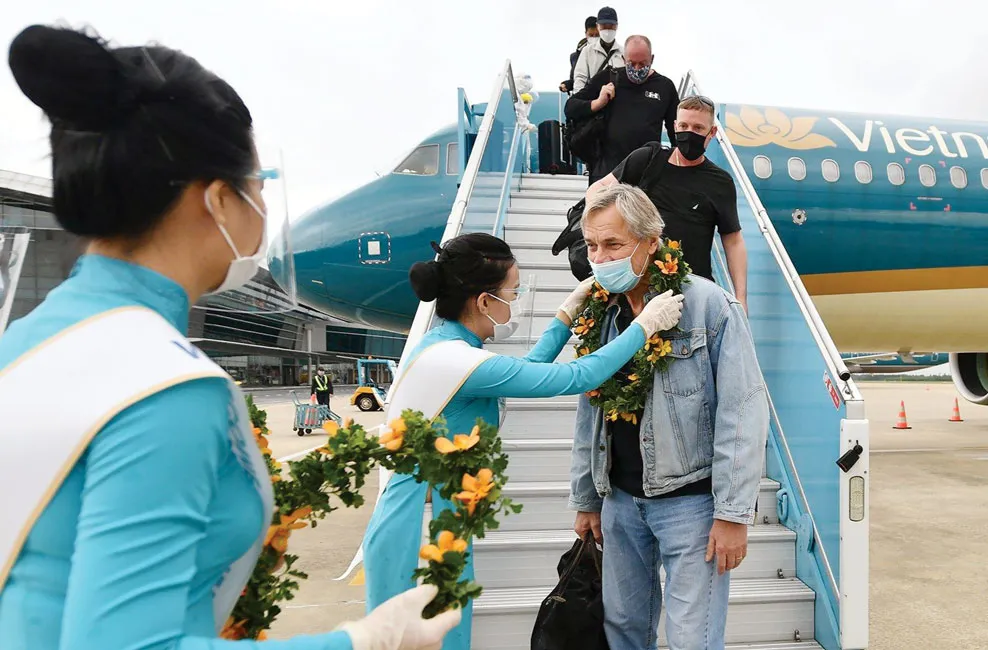
However, management agencies need to have appropriate and unified policies in creating maximum comfort and conveniences for all passengers upon entry. Only then will the plan to reopen tourism for international visitors become more feasibly successful.
Shorter quarantine period
According to Mr. Pham Viet Dung, Chairman of the Vietnam Aviation Business Association (VABA), a survey by the International Air Transport Association showed that more than 70% of international visitors said that they did not want to travel to countries with mandatory quarantine requirements on entry.
From practical experiences of other countries, the health safety procedures of passengers on entry are an extremely important condition for attracting international tourists and also an important factor for luring more travellers to countries and destinations. Many countries around the world have relaxed entry policies, and only require passengers who have been fully vaccinated or tested negative for Covid-19 to board a flight. There are also countries that offer passengers to be tested at entry point at the airport, such as in Singapore, or offer a one-day wait at a hotel, such as in Thailand, after which they can travel freely within the country.
The Ministry of Health in Vietnam has issued strict policies for people entering airports from various international routes. Representatives of different airlines said that the conditions were basically quite relaxed and convenient for visitors to enter. As per these new rules, arriving visitors must show proof of negative SARS-CoV-2 test results, using the gold standard PCR method, within 72 hours prior to entry, except in the case of children under two years of age. Travellers must declare their health status before entry, and must install Vietnam’s PC-COVID app that is available on both Android and iOS, for contact tracking and medical declaration purposes when travelling within Vietnam.
For those visitors who have received a full dose of Covid-19 vaccine or have recovered from the Covid-19 disease, it is not required that they be under quarantine, but they can self-isolate and monitor their health for following three days at their own personal accommodation, while also getting SARS-CoV-2 test by RT-PCR method on the third day from the date of entry. For people entering the country who have not been vaccinated or have not had enough doses of the Covid-19 vaccine, quarantine at the place of residence for seven days from the date of entry and testing for SARS-CoV-2 by RT-PCR method on third and seventh day will be required.
Many people argue that management agencies need to have more specific procedures for localities on decisions on passenger quarantine methods, otherwise it will be very difficult to implement these in practice. Besides, there are also other regulations that can make enforcement difficult. Along with a health policy, the Ministry of Foreign Affairs should hold negotiation talks and soon reach an agreement with other countries and territories on mutual recognition of vaccine passports.
According to information from the Civil Aviation Authority of Vietnam, currently, partner countries such as Japan, the UK, the US, and Belarus have recognized Vietnam's vaccination certificate and vaccine passport. Some other partner countries such as South Korea and China are waiting for a unified vaccine passport template and electronic confirmation. On the Vietnamese side, we have recognized vaccination certificates and vaccine passport forms from 78 countries and territories. These are favorable conditions to soon restore international flight routes to several destinations.
Prevention measures
According to airlines, it is feasible to remove the entry policy and make it possible to reopen regular international flights. Accordingly, in Phase 1, regular flights will be resumed to markets with high safety factors such as to Beijing in China, Tokyo in Japan, Seoul in South Korea, Taipei in Taiwan, Bangkok in Thailand, Singapore, Vientiane in Laos, Phnom Penh in Cambodia, San Francisco or Los Angeles in USA.
These are the markets with the most important foreign economic cooperation relations for Vietnam, with a large number of foreign investors, experts, and high-tech workers wishing to work with Vietnam, and explore business investment opportunities in Vietnam. At the same time, the number of Vietnamese citizens currently living, studying, and working in these countries and territories is high and there is also a high demand for repatriation.
In the next Phase 2, international flight routes will connect with nine important markets, such as Kuala Lumpur in Malaysia, Hong Kong in China, Paris in France, Frankfurt in Germany, Sidney in Australia, Moscow in Russia. These markets are all important cooperation partners with many economic investment activities, cultural exchanges, and tourism programs with Vietnam.
After a long period of stagnating, the resumption of international routes will be a great and welcoming opportunity for the whole aviation and tourism industry. Currently, airlines are preparing facilities, service personnel, service providers, travel agencies, and accommodation facilities to be ready when international flight routes reopen. The most important issue of concern to that airlines will have strict specific guidance on pandemic prevention measures for passengers upon entry.
Mr. Duong Hoai Nam, Director of VietJet Northern, said that pilot flights to welcome tourists to Phu Quoc and Hoi An over the past time have been very successful, showing that we have been able to control the situation. Moreover, if we require 100% safety, it is not possible to recover the economy, as we just need high vaccine coverage and we must actively have booster vaccines that can safeguard against the pandemic.




















